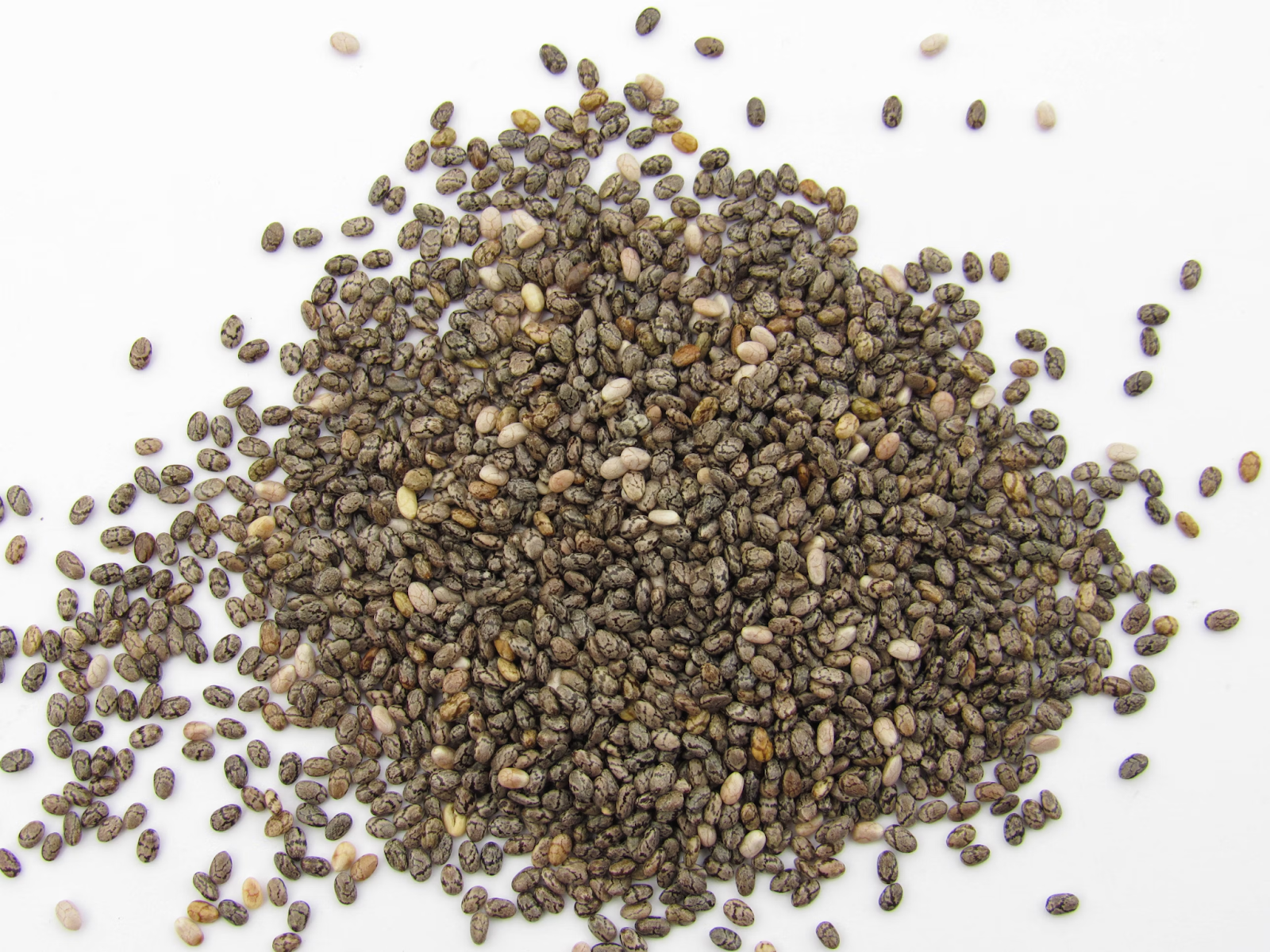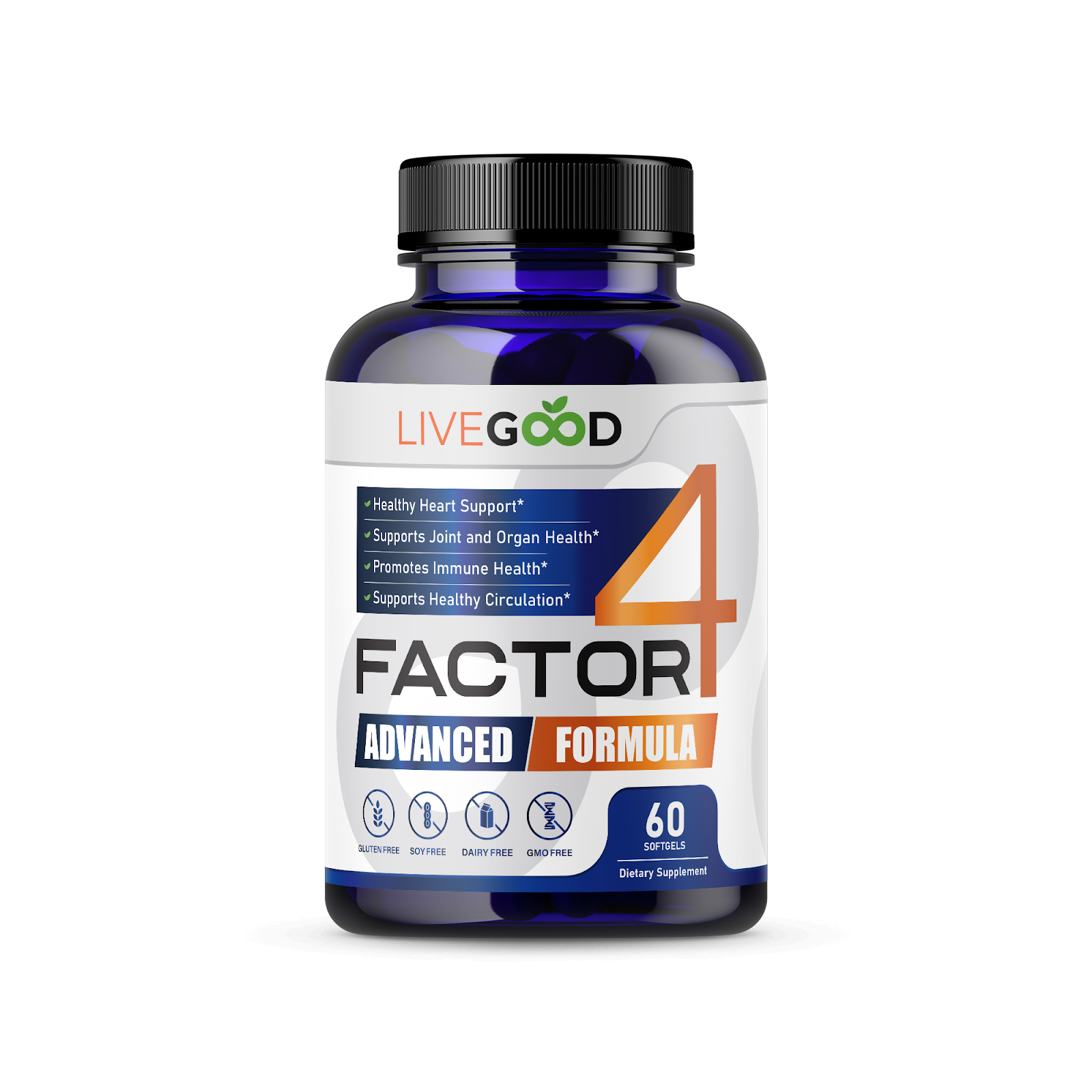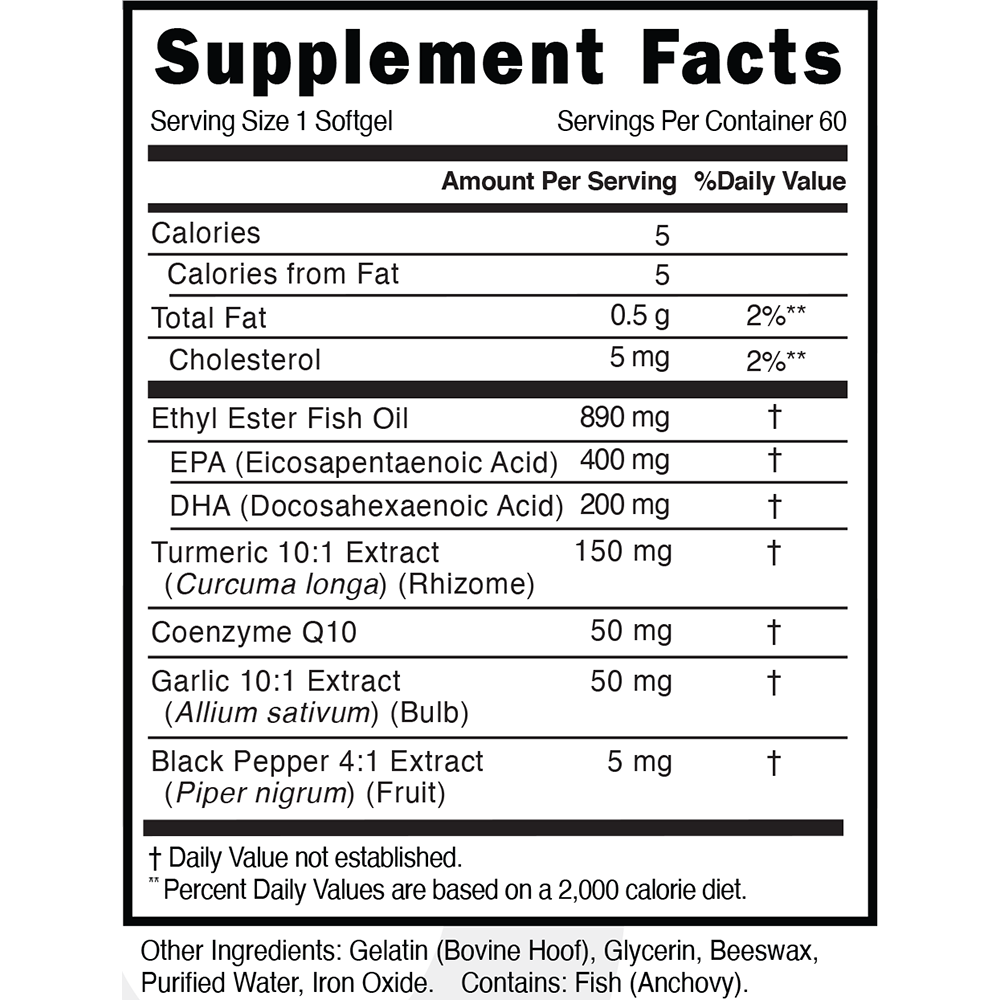How Much Fish Oil Should I Take for Inflammation Relief? Finding The Right Dosage Per Day

Key Takeaways
- Most people need 250-500 mg of combined EPA and DHA daily for general health.
- Higher doses of around 2,000-3,000 mg of combined EPA and DHA may be needed for inflammation relief.
- Fatty fish like salmon, mackerel, and sardines are great natural sources-two servings a week can help you meet your omega-3 needs.
- If you don't eat enough fish (or don't eat fish at all), supplements are a great way to make sure you're getting the right dose.
- LiveGood's Factor 4 combines Fish Oil with CoQ10, Curcumin, and Garlic for a comprehensive anti-inflammatory solution.
Importance of Fish Oil
Fish oil is pretty popular these days, and for good reason-it's PACKED with omega-3 fatty acids that are known for reducing inflammation. Plus, they're essential for various other bodily functions!
Sadly, our bodies cannot produce omega-3s, so we have to get them from other sources-like our diet or supplements.
But the benefits of fish oil don't stop at inflammation relief! Fish oil is also great for heart health, brain function, and even eye health! This makes it a versatile addition to anyone's health regimen.
LiveGood: Premium Health Supplements for Everyone
Discover the power of purity with LiveGood, where exceptional quality meets affordability in the nutritional supplements industry. Our commitment to top-quality, USD-certified organic ingredients and transparent sourcing ensures that every product, including our flagship Factor 4, delivers the best nutrients free from synthetic additives and fillers, supporting overall health and wellness. By operating on a membership-based model, we make these high-standard products accessible at prices well below traditional retail. Choose LiveGood for a healthier lifestyle without the high cost.
Anti-Inflammatory Benefits
Omega-3 fatty acids in fish oil are great for tackling inflammation. They work by decreasing the production of inflammatory molecules and substances, such as eicosanoids and cytokines, which are linked to chronic inflammation.
Adding fish oil to your diet can be a simple, natural way to manage inflammation!
Omega-3 Fatty Acids Role
The two main types of omega-3 fatty acids found in fish oil are EPA (eicosapentaenoic acid) and DHA (docosahexaenoic acid). EPA cuts down the production of inflammatory molecules, while DHA helps to maintain cell membrane health.
Together, they make a powerful duo in fighting inflammation!
Differences Between EPA and DHA
| Feature | Eicosapentaenoic Acid (EPA) | Docosahexaenoic Acid (DHA) |
|---|---|---|
| Chemical Structure | C20:5n-3 | C22:6n-3 |
| Primary Sources | Fatty fish (e.g., salmon, mackerel), fish oil supplements | Fatty fish, algae, fish oil supplements |
| Main Benefits | Reduces inflammation, lowers triglycerides, supports heart health | Supports brain function, eye health, fetal development |
| Health Effects | Mood improvement, anti-inflammatory effects | Cognitive function support, neuroprotective effects |
| Recommended Intake | Often recommended at higher doses for heart health | Generally recommended for brain health; important during pregnancy |
How EPA & DHA Reduce Inflammation
EPA and DHA can alleviate inflammation through several mechanisms, influencing various biological processes in the body. Some of them are:
- Alteration of Cell Membrane Composition: EPA and DHA replace arachidonic acid in cell membranes, leading to decreased production of pro-inflammatory eicosanoids and increased anti-inflammatory mediators.
- Production of Resolvin: Both EPA and DHA serve as precursors to specialized pro-resolving mediators (SPMs) that promote the resolution of inflammation and facilitate healing.
- Influence on Cytokine Production: Omega-3 fatty acids modulate cytokine production, reducing levels of pro-inflammatory cytokines like interleukin-1 (IL-1) and tumor necrosis factor-alpha (TNF-α).
- Direct Effects on Immune Cells: EPA and DHA interact with immune cells such as neutrophils and macrophages, altering gene expression to promote an anti-inflammatory state.
- Reduction of Inflammatory Biomarkers: Higher intakes of EPA and DHA are associated with lower levels of inflammatory biomarkers like C-reactive protein (CRP) and erythrocyte sedimentation rate (ESR).
Health Benefits Beyond Inflammation
While we're mainly talking about inflammation relief here, that's far from the only health benefit fish oil has to offer!
It can also help lower triglycerides, improve mood, and support joint health.

Determining the Right Dosage
Recommended Daily Intake
Most health organizations recommend a minimum intake of 250-500 mg of combined EPA and DHA per day for overall health maintenance. You can achieve this by consuming two servings of fatty fish (e.g., salmon, mackerel, herring) per week. A serving is 3 ounces of cooked fish, or about ¾ cup of flaked fish.
But, for noticeable benefits regarding inflammation and heart health, you should take between 2,000-3,000 mg of combined EPA and DHA daily.
People with high triglycerides may take up to 4,000 mg of combined EPA and DHA daily, as advised by the American Heart Association.
Fish Oil Dosage Limit
Doses up to 5,000 mg are generally considered safe, but be careful if you plan on exceeding this amount because of side effects like increased bleeding risk.
Factors Affecting Dosage
How much fish oil you need depends on several things, like your age, weight, diet, and the severity of inflammation.
For example, someone with chronic inflammatory conditions like rheumatoid arthritis may need a higher dose daily (about 2,700 mg of EPA and DHA) compared to someone looking to maintain general health.
Also, not everyone absorbs omega-3 fatty acids the same way. If you have conditions like pancreatitis or certain dietary restrictions, you may need higher doses or specific types of fish oil to get the benefits.
Consulting Healthcare Providers
Before starting any new supplement, it's always a good idea to check with a healthcare provider. They can help you figure out the right dose based on your health needs-so you can get the benefits without unnecessary risks!
- Start with a lower dose and gradually increase it.
- Monitor for any side effects like gastrointestinal discomfort.
- Choose the form of fish oil that best fits your lifestyle.
Food Sources vs. Supplements
Fish Sources and Serving Sizes
Fatty fish like salmon, mackerel, sardines, and herring are some of the best natural sources of omega-3 fatty acids. Adding these fish to your diet can give you a significant boost in EPA and DHA!
For example, just a 3.5-ounce (100-gram) serving of salmon can pack up to 2,260 mg of omega-3 fatty acids-more than enough to meet the general daily recommendation for most people. Of course, not everyone enjoys eating fish (and who can blame them?) or has access to high-quality sources, but luckily we have supplements.
Omega-3 Content in Common Types of Fish
| Type of Fish (3 oz. or 85 g serving) | Omega-3 Content (DHA + EPA) |
|---|---|
| Mackerel | 2.0 grams |
| Salmon (farmed, Atlantic) | 1.7 grams |
| Herring (Atlantic) | 1.3 grams |
| Anchovy | 1.2 grams |
| Salmon (wild, Atlantic) | 1.2 grams |
| Whitefish | 1.1 grams |
| Tuna (Bluefin) | 1.0 grams |
| Halibut (Greenland) | 0.8 grams |
| Sardines (Atlantic, canned in oil) | 0.8 grams |
| Tuna (Albacore, canned in water) | 0.7 grams |
| Bluefish | 0.7 grams |
| Striped bass | 0.6 grams |
| Rainbow trout (wild) | 0.5 grams |
| Tuna (light, canned in water) | 0.5 grams |
Achieving Dosage Through Diet
To get enough omega-3 fatty acids through diet alone, you'd need to eat fatty fish AT LEAST twice a week. This may work for some people (especially if you live near the coast where you can get delicious fresh fish), but it's not doable for everyone due to dietary preferences, allergies, or access to fresh fish.
So if fish isn't an option, you can get your omega-3s elsewhere-like flaxseeds, chia seeds, and walnuts. But keep in mind that these contain ALA (alpha-linolenic acid), which is not as effective as EPA and DHA found in fish oil. And if you're looking for anti-inflammatory benefits, relying on plant-based sources likely won't cut it.

Benefits of Supplements
Fish oil supplements are a convenient way to ensure you get the right amount of omega-3 fatty acids daily-especially if you don't eat much fish or have dietary restrictions!
And you'll be spoiled for choice too; supplements come in various forms-from capsules and liquids to gummies! Plus, they're standardized to contain specific amounts of EPA and DHA, giving you a reliable source of these essential nutrients every day, every time.
LiveGood Factor 4 Supplement
One of the standout products in the market for inflammation relief is LiveGood's Factor 4. Factor 4 contains Fish Oil, CoQ10, Curcumin, and Garlic, making it a POWERFUL all-in-one supplement for addressing various health concerns, including heart health, joint pain, and overall inflammation reduction.

Key Ingredients
LiveGood's Factor 4 supplement is a standout product for those looking to manage inflammation, the easy way! It combines FOUR potent ingredients: Fish Oil, CoQ10, Curcumin, and Garlic. Each of these components has been clinically researched and shown to provide significant health benefits.
- Fish Oil: Rich in omega-3 fatty acids, it is the primary ingredient that helps reduce inflammation.
- CoQ10: Has a role in energy production and is a strong antioxidant.
- Curcumin: Derived from turmeric, it has powerful anti-inflammatory effects-it has been used in traditional medicine for centuries!
- Garlic: Provides additional anti-inflammatory and cardiovascular benefits, making it an all-in-one solution for multiple health concerns.
Our Factor 4 supplement stands out for its high-quality ingredients and competitive pricing! At LiveGood, we're transparent about the sourcing of all key ingredients, which are also free of synthetic additives and unnecessary fillers, ensuring you get only the best nutrients.

How to Use
Taking LiveGood's Factor 4 supplement is super simple. All you have to do is follow the recommended dosage on the packaging: one softgel twice daily, taken with meals. This helps improve absorption and minimizes the risk of upset stomach, which can sometimes occur with fish oil supplements.

Importance of Consistent Intake
Taking your fish oil supplement at the same time each day helps keep omega-3s levels steady, maximizing their anti-inflammatory effects.
Plus, sticking to a routine makes it easier to take your supplements, so you're less likely to miss a dose. And this is super important if you want to make sure you get the full benefits (and you do!).
- Take your fish oil supplement at the same time each day.
- Incorporate it into your daily routine to make it a habit.
- Check with your healthcare provider to find the right dose for you.
Frequently Asked Questions
How much fish oil should I take daily for inflammation relief?
For inflammation relief, a daily intake of 2,000-3,000 mg of combined EPA and DHA is generally recommended. For chronic inflammatory conditions, such as rheumatoid arthritis, you can take a higher dose of around 2,700 mg.
Can I get enough omega-3s from my diet, or do I need supplements?
Depends on your diet. It's possible to get enough omega-3s from your diet if you eat fatty fish (like salmon, mackerel, or sardines) at least twice a week. If not, fret not-supplements are a convenient option if you don't eat fish regularly (or at all!) or if you need higher doses for therapeutic benefits.
Are there any side effects of taking too much fish oil?
Doses up to 5,000 mg of combined EPA and DHA per day are considered safe for most people. But, taking more than this can increase the risk of side effects like gastrointestinal issues and bleeding.
What is the best time of day to take the Factor 4 supplement?
It's best to take one Factor 4 softgel with meals, twice daily, to enhance absorption and reduce the risk of an upset stomach. Taking them at the same time each day also helps maintain consistent omega-3 levels in the body, which helps you get the full benefits.